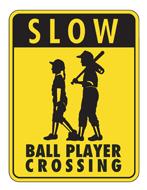Little League expects not only coaches to watch out for player's safety but parents too.
Concussion Information - To help ensure the safety of our young athletes, NLLB will share information provided by the CDC (Center for Disease Control and Prevention) to all our managers, umpires and volunteers. The CDC developed the HEADS UP Concussion in Youth Sports initiative to offer information about concussions to coaches, parents, and athletes involved in youth sports. Click here for a information on the CDC HEADS UP Concussion in Youth Sports initiative.
Bat Safety – No child at a game is allowed to swing a bat before or during an inning except the current batter. If you see more than one kid swinging a bat at a game either on the field or outside the fence, please speak up and stop them.
Pitching Safety - Baseball is a safe game to play at all ages, but research has shown that pitching too much, particularly at a young age, can increase a pitcher's risk of injury. Click here for more details.
Contact Information – While your child is under the care of a Little League coach at a game or practice, and you will not be in attendance, be sure to leave your contact information with him. You must always be available to receive a call during this time. Don’t place your coach in the situation of dealing with a serious health issue without your knowledge. Your child’s coach is willing to handle simple first aid or other minor health problems, but if anything serious develops, they will be calling you and/or 911.
Additionally, if your child has a medical condition that could come into play during a baseball game or practice…..let your coaches know. Once again, your coach can provide a modicum of assistance, but you must be available for serious conditions. Any serious condition that develops will be handled by a 911 call.
No Peanuts – Many of our kids have serious allergies. For that reason peanuts are not allowed in the dugouts or stands at any time. Allergic Reaction Information
Lightning Safety – Four of our fields are equipped with lightning detectors provided by the Park District (these are DuPage River, Nike (2), and the Beach).
The signal is activated by threatening weather. You will hear one long warning signal and see a flashing light on top of devices. When the signal activates, all activities must be suspended and patrons must seek shelter immediately. Sitting in the stands, the dugout, or under a tree is not "shelter". Once the threat of lightning has passed, you will hear three short bursts from the siren. This indicates that activities can resume. This system is not fail-proof. Take shelter immediately when lightning threatens even if a signal has not sounded. Click here for more information.
At all other fields, no such detector system exists. No place OUTSIDE is safe in or near a thunderstorm. Stop what you are doing and get to a safe place immediately. Small outdoor buildings including dugouts, rain shelters, sheds, etc., are NOT SAFE. Substantial buildings with wiring and plumbing are the safest places. Once inside, stay away from windows and doors and anything that conducts electricity such as corded phones, wiring, plumbing, and anything connected to these. A hard-topped metal vehicle with the windows closed also provides good protection. Avoid contact with metal in the vehicle and try to keep away from windows.
Please familiarize yourself with the information contained at these two websites:
http://www.lightningsafety.noaa.gov/sports.html
http://www.littleleague.org/learn/programs/asap/lightning.htm


